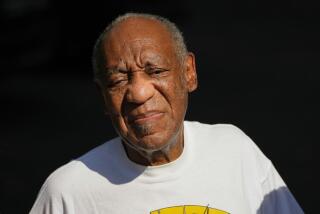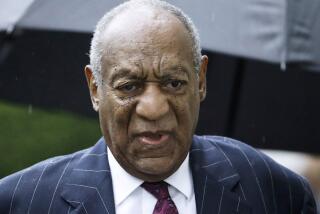‘Cosby’ Makers Ask NBC for a $100-Million Bonus
- Share via
In an unprecedented negotiation, producers of “The Cosby Show” have asked the National Broadcasting Co. for a $100-million “signing bonus” to renew the hit television comedy for next season, a fee that the network is unlikely to pay but which illustrates the dizzying stakes at play if NBC wants to maintain its ratings winning streak of the last six years.
A renewal of “Cosby” on terms now being discussed would be significant because it would signal a dramatic shift in NBC’s thinking. Until now, the network television business has always been one of many failures occasionally interrupted by a hit. Because of the bizarre process by which shows are developed, only a few ever get on the air, and fewer still succeed once they are on the air. The ones that make it, however, can be immensely profitable for both the network and producers.
Although Carsey-Werner Co., the show’s producer, will not get its asking price, the eventual fee is still expected to be high enough to wipe out NBC’s profits on the show. If NBC chooses to renew “Cosby,” it would mean the network is willing to keep the show on the air as a “loss leader” to attract audiences for its other shows, particularly those that follow “Cosby” on Thursday night.
Up to now, that kind of thinking has been applied only to sports and special programming such as the Olympics or big-budget miniseries. In these cases, huge investments have been justified on grounds that the shows can be used to promote regular series, traditionally the moneymaking backbone of network television.
Over the last eight weeks, producers Marcy Carsey and Tom Werner--as well as Norman Brokaw, Bill Cosby’s agent--have been engaged in a remarkable round of negotiations with NBC Entertainment chief Brandon Tartikoff and other executives over the renewal of “Cosby” for a seventh season.
According to knowledgeable sources, the producers first asked for a $100-million “signing bonus.” To bolster their case, the producers hired an outside media consultant who told network officials what the producers believed NBC has earned from “Cosby” since its debut in 1984.
“It was a stickup,” said one network executive.
NBC sought a two-year renewal, but the producers countered with a request for a $75-million bonus and a one-year renewal. In addition, Carsey-Werner wanted NBC to pay $1 million an episode to cover all “direct costs” associated with the show.
Generally, networks’ license fees do not cover all the costs of producing a show. Instead, producers make their profits on the “back end,” when enough episodes have been made so the series can be sold in reruns to local stations. In the case of “Cosby,” back-end revenues total an eye-popping $575 million and will increase substantially each year the show is on the network.
At one point, sources said, Carsey-Werner considered forgoing the “bonus payment” if NBC agreed to hike its license fee to $3 million per half-hour show, but the network declined. The discussions now have shifted back to the concept of a signing bonus, said to be about $25 million, depending on commitments that the network may make for other Carsey-Werner programs. The producers still want NBC to pick up the $1-million tab it costs to make each episode.
David Brokaw, a spokesman for Carsey-Werner, said it is “the company’s policy not to comment on matters of this kind.”
NBC’s Tartikoff also declined comment about the negotiations but said the network still had not reached final agreement with the show’s producers. He acknowledged that the main issue keeping the sides apart is money, and told The Times last week after presenting the network’s fall development projects to advertisers: “When you’re talking about renewing the No. 1-rated show in television, it’s a question of how high you’re willing to go. They have one level and we have another level.” He added that the parties were in the “final throes” of negotiations.
Insiders expect NBC to renew “Cosby,” even if it runs as a loss leader. But both network executives and producers are apprehensive about what the renewal means for similar negotiations in the future, especially if marginal shows are dropped or financially squeezed as a result of mega-fees being paid for hits. If marginal programs are not given a chance to stay on the air and develop an audience, some industry executives worry, the networks will become even more dependent on a handful of hit shows.
More to Read
The biggest entertainment stories
Get our big stories about Hollywood, film, television, music, arts, culture and more right in your inbox as soon as they publish.
You may occasionally receive promotional content from the Los Angeles Times.










